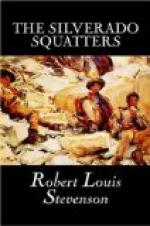South Vallejo is typical of many Californian towns. It was a blunder; the site has proved untenable; and, although it is still such a young place by the scale of Europe, it has already begun to be deserted for its neighbour and namesake, North Vallejo. A long pier, a number of drinking saloons, a hotel of a great size, marshy pools where the frogs keep up their croaking, and even at high noon the entire absence of any human face or voice—these are the marks of South Vallejo. Yet there was a tall building beside the pier, labelled the Star Flour Mills; and sea-going, full-rigged ships lay close along shore, waiting for their cargo. Soon these would be plunging round the Horn, soon the flour from the Star Flour Mills would be landed on the wharves of Liverpool. For that, too, is one of England’s outposts; thither, to this gaunt mill, across the Atlantic and Pacific deeps and round about the icy Horn, this crowd of great, three-masted, deep-sea ships come, bringing nothing, and return with bread.
The Frisby House, for that was the name of the hotel, was a place of fallen fortunes, like the town. It was now given up to labourers, and partly ruinous. At dinner there was the ordinary display of what is called in the west a two-bit house: the tablecloth checked red and white, the plague of flies, the wire hencoops over the dishes, the great variety and invariable vileness of the food and the rough coatless men devoting it in silence. In our bedroom, the stove would not burn, though it would smoke; and while one window would not open, the other would not shut. There was a view on a bit of empty road, a few dark houses, a donkey wandering with its shadow on a slope, and a blink of sea, with a tall ship lying anchored in the moonlight. All about that dreary inn frogs sang their ungainly chorus.
Early the next morning we mounted the hill along a wooden footway, bridging one marish spot after another. Here and there, as we ascended, we passed a house embowered in white roses. More of the bay became apparent, and soon the blue peak of Tamalpais rose above the green level of the island opposite. It told us we were still but a little way from the city of the Golden Gates, already, at that hour, beginning to awake among the sand-hills. It called to us over the waters as with the voice of a bird. Its stately head, blue as a sapphire on the paler azure of the sky, spoke to us of wider outlooks and the bright Pacific. For Tamalpais stands sentry, like a lighthouse, over the Golden Gates, between the bay and the open ocean, and looks down indifferently on both. Even as we saw and hailed it from Vallejo, seamen, far out at sea, were scanning it with shaded eyes; and, as if to answer to the thought, one of the great ships below began silently to clothe herself with white sails, homeward bound for England.




